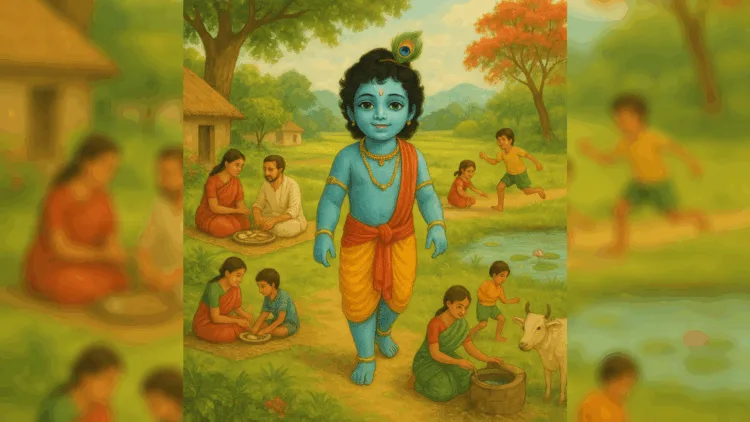‘ഗ്രാമം തണലൊരുക്കട്ടെ…ബാല്യം സഫലമാവട്ടെ…സഫലബാല്യത്തിന് ഷോഡശ (16) കുടുംബ ശീലങ്ങൾ തുണയായിടട്ടെ’ ഇതാണ് ഇത്തവണത്തെ ജന്മാഷ്ടമി സന്ദേശം.
സാംസ്കാരിക ജീവിതത്തിൻ്റെ നൈർമല്യം, കുളിർമ്മ, വകതിരിവ് എന്നിവയിലേക്ക് തിരിച്ച് പോകാനുള്ള ആഹ്വാനം. അതായത് ഭാരതീയ ജീവിതശൈലിയിലേക്ക് നമുക്ക് മടങ്ങാം എന്നു സാരം.
എന്താണ് ഭാരതീയ ജീവിതശൈലി? ധാർമ്മിക ജീവിതത്തിലൂടെ അർത്ഥ, കാമ, മോക്ഷ സമ്പാദനം ആണത്.
പല തരം ആധ്യാത്മിക സാധനകളിൽ അവനവന്റെ അഭിരുചിക്കിണങ്ങുന്ന വഴിയിലൂടെ നേടാൻ കഴിയുന്ന ശാശ്വത സുഖം ആണ് മോക്ഷം എന്ന പരമപുരുഷാർത്ഥം.
നമ്മുടെ പഞ്ചേന്ദ്രിയങ്ങൾ, മനസ്സ്, ബുദ്ധി എന്നിവയിലൂടെ നാം നേടുന്ന ക്ഷണികസുഖങ്ങൾ കാമത്തിൻ്റെ പട്ടികയിൽ പെടുന്നു. നൃത്തവും ഗീതവും വാദ്യവും ചിത്രമെഴുത്തും സാഹിത്യവും എല്ലാം അതിനുള്ള വഴികൾ ആണ്.
എന്താണ് അർത്ഥം? മേൽപ്പറഞ്ഞ രണ്ടു തരം സുഖങ്ങളും നേടാനുള്ള സാമഗ്രികൾ എല്ലാം അതായത് ഉപ്പ് തൊട്ട് കർപ്പൂരം വരെ ഉള്ളതെല്ലാം അർത്ഥത്തിൽ പെടുന്നു.
എന്താണ് ധർമ്മം? വ്യക്തി, കുടുംബം, സമുദായം, സമൂഹം, രാഷ്ട്രം, ലോകം, പ്രകൃതി എന്നിങ്ങനെയുള്ള ജീവിതത്തിൻ്റെ ഏഴു തലങ്ങളുടെ സ്വച്ഛമായ നിലനിൽപ്പിനായി നാം സ്വയം പാലിക്കേണ്ട പത്ഥ്യങ്ങളുടെ സമാഹാരം ആണത്. ഈ ഏഴു തലങ്ങളും വേണ്ടതുപോലെ നിലക്കൊണ്ടാലേ ഓരോ വ്യക്തിക്കും മേൽപ്പറഞ്ഞ കാമ മോക്ഷങ്ങളിലൂടെ സംതൃപ്തി നേടാനാകൂ.
നമ്മുടെ പൂർവ്വികർ മെനഞ്ഞെടുത്ത ഈ ശാസ്ത്രീയമായ ജീവിതചര്യ ആയിരക്കണക്കിന് ആണ്ടുകളായി തലമുറകളിലൂടെ പകർന്നു നില നിന്നു പോന്നു. പക്ഷേ കഴിഞ്ഞ കുറെ തലമുറകളായി കാലഗതിയിൽ നമുക്ക് ഇതു കൈമോശം വന്നിരിക്കുന്നു. അതിനാൽ ബാല്യം തൊട്ടു വാർദ്ധക്യം വരെ നമുക്കിന്ന് അവശതകൾ പലതാണ്, ഏറെയാണ്.
അപ്പോൾ ഭൂമിയിൽ സ്വർഗ്ഗം പണിയാൻ കെൽപ്പുറ്റ ജീവിതത്തിൻ്റെ ആ തനതു ശൈലിയിലേക്ക് നമുക്ക് തിരിച്ച് പോയേ തീരൂ.
അതിന് പോംവഴി എന്ത്? വഴി ഒന്നേ ഉള്ളൂ. നമ്മുടെ കുടുംബജീവിതത്തിൽ ആവശ്യം ആയ തിരുത്തലുകൾ ബോധപൂർവം വരുത്തുക. കാരണം കുടുംബം ആണ് എല്ലാ തരം കൂട്ടായ ജീവിതത്തിൻ്റെയും അടിസ്ഥാന ഏകകം (Unit), ആദ്യത്തെ കളരി.
ഈ അടുത്തിടെ ഒരു വീഡിയോ കാണാനിട വന്നു. ജപ്പാൻകാർ തങ്ങളുടെ ജീവിതത്തിൻ്റെ ഭദ്രതയ്ക്കും തുടർച്ചക്കും ആയി തലമുറകളായി അവലംബിക്കുന്ന ഉപായം ആണ് അതിൽ വിവരിക്കുന്നത്. അത് കണ്ടപ്പോൾ ആശ്ചര്യവും നഷ്ടബോധവും സന്തോഷവും തോന്നി. കാരണം നമ്മുടെ പൂർവികർ അനുവർത്തിച്ചിരുന്ന വഴി ആണ് അത്. മറ്റൊരു സമൂഹം അതിനെ ജീവിതത്തിൽ സ്വാംശീകരിച്ചതു കണ്ടപ്പോൾ ആശ്ചര്യം തോന്നി. നാം അതിനെ മറന്നതിൽ നഷ്ടബോധം തോന്നി. അവരെങ്കിലും അതിനെ നിലനിർത്തി വരുന്നതിൽ സന്തോഷവും തോന്നി.
സംസ്കൃതഭാഷയിലെ ശ്ളോകരൂപത്തിൽ ഇന്നും നമുക്കത് ലഭ്യമാണ്. ഇതാണ് ആ ശ്ളോകം:
“രാജവത് പഞ്ചവർഷാണി ദശവർഷാണി ദാസവത്. പ്രാപ്തേ തു ഷോഡശേ വർഷേ പുത്രം മിത്രവദാചരേത്”.
അതിൻ്റെ അർത്ഥം ഇതാണ്: ഒരു കുഞ്ഞു ജനിച്ചാൽ ആദ്യത്തെ അഞ്ചു വർഷം രാജാവിനെ പോലെ അതിനെ പരിചരിക്കണം. അഞ്ചു വയസ്സു മുതൽ പതിനഞ്ചു വയസ്സു വരെ ദാസനെ പോലെ കരുതി നയോപായങ്ങളിലൂടെ ജീവിതത്തിൻ്റെ ചിട്ടവട്ടങ്ങൾ പഠിപ്പിക്കണം. പതിനാറു വയസ്സ് തികഞ്ഞാൽ ആ സന്തതിയെ മിത്രത്തെ പോലെ കരുതി പെരുമാറണം.
ഇനി നമുക്ക് ആ വീഡിയോയിൽ പറയുന്നത് ശ്രദ്ധിക്കാം.
“Why the Japanese treat children aged 5to 15 like servants? Is it okay to leave a 5- year old unsupervised? In the West you could lose custody. For something like that. But Japanese parents consider it not just okey but necessary. This stems from Japan’s unique parenting philosophy. Children are considered perfect until they turn 5. Toddlers are pampered and spoiled with no restrictions.
But between 5 and 15 children are like servants. At that age they learn to live by the rules of society. They are expected to find their purpose in this world. They must learn to put the society’s needs above their own. By age 15, children become full members of society. They are considered equal to their parents and other adults.
Japanese parents believe in talking to their kids. This to teach them to distinguish good from evil. The Japanese parents will point out their child’s mistake and discuss it.They will direct their kids to avoid repeating it.
Japanese parents prefer private discipline to public scolding. Children are taught to behave at home. But what if they misbehave in public? The parent will find a private place to discipline them. This method preserves the kid’s confidence. It saves them from embarrassment and public pressure. The child can learn to respect others. Japanese children are taught to co-exist in a community.
Parents help them to process negative emotions. The children are taught to avoid being too straightforward. They are taught to see and understand the emotions of others. A kid may try to break their toy car. A Japanese mom will say ‘Poor car. It is going to cry’. A Western mom will probably rebuke. ‘Stop it. It is bad’.
Japanese parents practice the authoritative parenting style. The caregiver’s word is final. Western parents often prefer permissive parenting. They let their kids do as they wish. (According to modern psychology, this causes entitlement feeling- I am exclusive ,special, all others are subservient to me, no need to care others’ words etc., in the kid).
When Japanese kids reach the age of 5, they become self-reliant. They go to school by themselves. Even in public transport, they are unaccompanied; the country’s low crime rate means it is safe for kids. Japanese parents rely on the community.
Authoritative parents are also role models for their kids. There was an experiment that involved Japanese and European moms. They were asked to construct a pyramid. The Japanese moms built the pyramid on their own. Then they asked their children to replicate it. If the children failed, the moms started all over again. The European moms explained how to build the pyramid. Then they asked their children to try. The Japanese moms followed the “do it the way I do” rule.
In Japan, raising children is primarily a woman’s job. Japanese moms don’t send their kids to kindergarten until they are 3. They don’t rely on baby sitters or relatives to raise their kids. Nevertheless building strong family relations is important.
Japanese parents don’t talk about much of their children. Mentioning that your child plays on the soccer team may seem boastful. It is enough if he is seen in public wearing uniform.
Today, Western values also influence Japanese traditions. But the central concepts of parenting are unchanging.”
ഒരു കഥ കൂടി പറഞ്ഞ് നമുക്കീ ചർച്ച അവസാനിപ്പിക്കാം. ഒരിടത്ത് ഒരു വഴിയരുകിൽ ഒരാൾ പഴക്കം ചെന്ന ഒരു പെട്ടിയുടെ മേൽ ഇരുന്ന് വഴിപോക്കരോടു ഭിക്ഷ യാചിച്ചു വന്നിരുന്നു. ആ വഴി പോയ ഒരു താപസനു നേരെയും അയാൾ കൈനീട്ടി. ആ താപസൻ അയാളോട് അയാൾ ഇരിക്കുന്ന ആ പെട്ടി എപ്പോൾ എങ്കിലും തുറന്നു നോക്കിയിട്ടുണ്ടോ എന്നു ചോദിച്ച് നടന്നു പോയി. പിച്ചക്കാരന് അപ്പോൾ ആ പെട്ടി തുറന്നു നോക്കണം എന്നു തോന്നി. നോക്കിയപ്പോഴോ…അയാൾക്കും അയാളുടെ സന്തതി പരമ്പരകൾക്കും സുഖമായി കഴിയാനുതകുന്നത്ര സ്വർണ്ണവും രത്നങ്ങളും ആയിരുന്നു അതിൽ നിറഞ്ഞ് കണ്ടത്.
അതെ, നാമിന്ന് നമ്മുടെ പാരമ്പര്യച്ചെപ്പ് ഒന്ന് തുറന്നു നോക്കാൻ പോലും മെനക്കെടാതെ മറ്റുള്ളവരുടെ മുന്നിൽ കൈ നീട്ടുകയല്ലേ.




















Discussion about this post